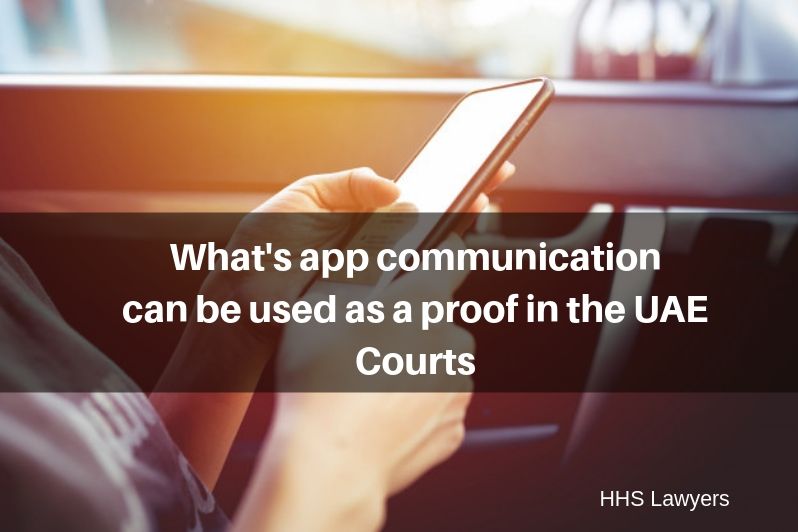Electronic communication is considered as one of the most common methods of communication. It does become essential to understand if a contract can be entered into and considered valid if it takes place through electronic means. There are electronic communication platforms such as emails, short messaging service (SMS) and social media e.g. WhatsApp, where contracts are entered into and they may be considered valid as per the law. Legal consultants in Dubai can provide information regarding various kinds of evidence that may be admissible in the UAE Courts.
Guidelines to use electronic communication as proof in the UAE Courts
- The UAE Courts allow the admission of electronic communication as proof of a valid contract. This is governed by the Electronic Transactions and Commerce Law No. 2 of 2002 and Federal Law No. 1 of 2006.
- According to Article 7 (1) of the Electronic Transactions and Commercial Law No. 2 of 2002, any electronic communication submitted to the court as proof cannot be declined solely due to its electronic form.
- Further Article 8 (1) of the 2002 law explains that such a communication can be treated as evidence in the court provided that it fulfills the given provisions under the law such as the record submitted as a proof is an originally generated communication and can represent the accurate information sent or received. This means that an electronic communication ‘forwarded’ or not generated genuinely from either party may be considered unacceptable in the courts.
- Article 13 of the Electronic Transactions and Commercial Law No. 2 of 2002 and Article 11 of the Federal Law No. 1 of 2006, explains that a valid contract may exist between the parties if there are an offer and acceptance, partly or fully through electronic communication.
Importance of time and location in a valid contract through electronic communication
- It is essential to be aware of the time of communication to create a valid contract between the parties through electronic means.
- The court will consider the time of the sent message (also known as the time of despatch) and the time the message was received (also known as the time of receipt)
- As per the general law that governs laws pertaining to the time of the contract, the time of despatch and time of receipt will be taken into consideration, and not the time the message or text was read. For instance, if an email was sent at 12:00 pm, and was received by the other person at the same time, but the recipient read that email at 17:00 pm then the court will consider the contract formed at 12:00 pm and not at 17:00 pm.
- The courts consider the location of the formation of contract important to determine if the contract is valid within the said jurisdiction. This is easily determined in a physical contract. However, contracts made through electronic communication face a stricter approach wherein the validity of the communication is subject to the location of the sender and receiver. If either party is located in a different jurisdiction during the formation of the contract, the contract may be subject to the governing laws of the other jurisdiction. Article 17 of the Electronic Transactions and Commercial Law No. 2 of 2002 consists of a list of provisions pertaining to the location of the electronic communication.
Errors made during electronic communication
If any error is made during the electronic communication, Article 15 of the Electronic Transactions and Commercial Law No. 2 of 2002 requires the parties to take reasonable care or implement an agreed procedure to rectify such errors made during the communication. Further, both parties should be aware of the intention of the sender, while sending any information through electronic communication.
Exemption from the application of the law
Article 5 of the Electronic Transactions and Commercial Law No. 2 of 2002 lists a few instances where an electronic communication may not be considered applicable in courts as per the law. Few of these situations are the following:
- Any transaction, issue or contract entered through electronic communication pertaining to personal law such as marriage, divorce, custody, and wills to name a few.
- Any document or deed related to the title to immovable property. This is related to the ownership of immovable property.
- A negotiable instrument, that is considered as a legally binding document.
- Any transaction or contract entered into that concerns the sale and purchase or the disposal of immovable property, or a contract entered into for the rent or lease of the immovable property for a period of more than 10 years.
- If a document requires to be notarized by a Notary Public.
These cases may be subject to amendment or any new situation can also be exempted from the application of this law as per the discretion of the court.
Gathering evidence for various civil cases can often be a difficult task, especially if the evidence is in electronic form. HHS Lawyers has a team of qualified civil lawyers that offer legal consultations regarding civil cases, the firm also provides assistance in gathering proof that can help make cases stronger.

